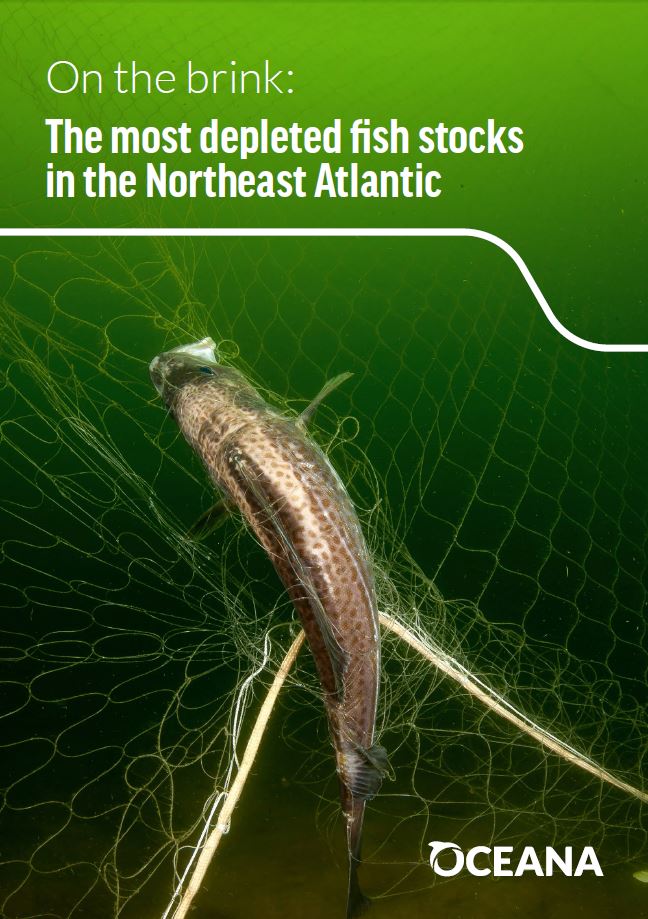Report | December 9, 2022
On the brink: The most depleted fish stocks in the Northeast Atlantic
Executive Summary
European countries have committed to restore and maintain populations of commercial fish species above sustainable levels. However, despite some progress made during recent years, the status of some fish stocks continues to be in a critical state. Thus, based on the latest available scientific information, Oceana has identified the over 20 depleted fish stocks in the Northeast Atlantic, to highlight their ongoing dire status and the urgent need for management measures aimed at their recovery.
The list of Northeast Atlantic depleted stocks covers a diverse group of species (including pelagic, demersal, and benthic species) and sea basins, from the Baltic Sea to the west of Scotland and from the Barents Sea to Iberian waters. Species like anchovy, eel, herring, horse mackerel, Norway lobster, sardine, and whiting, among others, have one or more stocks that are known or considered to be depleted. The most extreme case is that of cod, with the highest number of depleted stocks (nine) across the whole region.
The depletion of these stocks raises concerns not only about their status, but also about the possibility that their abundance may have fallen below tipping points that have negative biological and ecological implications, as well as adverse economic and social consequences, since the stocks cannot sustain direct exploitation. Their reproductive capacity is impaired, and there is an increased risk of stock collapse. This situation also makes these stocks more vulnerable to anthropogenic pressures (such as habitat degradation and loss) and to environmental variation, including in relation to climate change.
Most depleted stocks in the Northeast Atlantic are managed jointly by different parties, mainly by the European Union and the United Kingdom, through a solid regulatory framework that, if well implemented, would facilitate the recovery and sustainable exploitation of depleted stocks. Nevertheless, only very limited attempts have been made to apply measures for their recovery (e.g., catch limits and technical measures). Indeed, depleted stocks are far from meeting the objectives set for their international and domestic management. For example, the abundance of the three most heavily depleted stocks, Irish Sea whiting, West of Scotland cod, and Celtic Sea cod, is only 8%,16%, and 21%, respectively, of the minimum target.
Overfishing is the main driver that has reduced the abundance of depleted stocks to unsustainable levels. Despite being clearly problematic, this excessive fishing pressure has been long ignored: for all of the most heavily depleted stocks, fishing mortality has exceeded sustainable levels for nearly the entire duration of the time series. The situation of the depleted stocks is so alarming that, in most cases, scientists advise that catches must be strongly reduced or stopped altogether (i.e., ‘zero catch’) to facilitate their recovery and sustainable exploitation. The need to implement such reductions is made more pressing by the fact that stock recovery is being hampered by other ongoing anthropogenic impacts and environmental changes, such as habitat degradation and climate change. Nevertheless, the scientific recommendations are regularly ignored by decision-makers.
A further complication arises because depleted stocks are typically captured as by-catch together with other fish stocks in mixed fisheries. Management decisions related to the exploitation rate and pattern of stocks caught in mixed fisheries typically take a stock-by-stock approach, and prioritise the catches of the most productive stocks, rather than securing the recovery of those stocks with the poorest conservation status. In addition, there are signs of non-compliance with the provisions of the landing obligation, such that illegal discarding continues to be a problem. As result, actual catches of depleted stocks may far exceed the levels that are scientifically advised for permitting them to recover.
Based on the findings of this report, any prospect of recovering these severely overexploited fish populations appears unlikely without decisive management action. Implementation of adequate policies and measures by Northeast Atlantic decision-makers, such as the EU and UK, is both crucial and urgent to recover depleted stocks above sustainable levels in the shortest possible time. Oceana therefore recommends that these decision-makers act without delay to:
- Adopt multi-year management strategies for stock recovery;
- Set catch limits in line with scientific advice;
- Prioritise the recovery needs of depleted stocks in mixed fisheries;
- Fully document fisheries that target or catch depleted stocks as bycatch;
- Implement the most effective by-catch reduction measures;
- Eliminate anthropogenic activities that negatively affect depleted stocks;
- Avoid any increase in fishing capacity of fleets catching depleted stocks;
- Protect essential fish habitats (those habitats that are critical for the life cycle of exploited fish species); and
- Safeguard food availability for depleted stocks.


